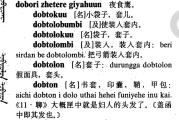1)can could 表示能力;可能 (过去时用could),
只用于现在式和过去式(could)。be able to可以用于各种时态。
They will be able to tell you the news soon。
他很快就能告诉你消息了。
2)只用be able to
a。 位于助动词后。
b。 情态动词后。
c。 表示过去某时刻动作时。
d。 用于句首表示条件。
e。 表示成功地做了某事时,只能用was/were able to, 不能用could。
He was able to flee Europe before the war broke out。
= He managed to flee Europe before the war broke out。
注意:could不表示时态
1)提出委婉的请求,(注意在回答中不可用could)。
--- Could I have the television on?
--- Yes, you can。 / No, you can't。
2)在否定,疑问句中表示推测或怀疑。
He couldn't be a bad man。
他不大可能是坏人。
can用于表示“能力”时是指现在的能力,过去或将来的能力通常用was/were able to或will/shall be able to表示。
eg。 She was able to go to school yesterday。
Soon she will be able to swim a quarter of a mile。
Can的过去式形式could也可用于表示泛指过去的能力。如:
I could read when I was four。
但不能用于表示特定的某一过去能力,如不能说:
*He could swim halfway before he got tired。
He was able to swim halfway before he got tired。
上述这种用法的区别不存在于否定句中。在否定句中,couldn’t与was/were not able to 可以互换使用。
eg。 I couldn’t see him again before he left。
I wasn’t able to see him again before he left。
另外,要说一个阶段延续至今的能力,可用have/has been able to表示。
eg。 John has been able to swim for many years。
注意的一点是:can也可以用于表示“许可”。
它可以表示现在许可或将来许可,过去许可用could表示,此时一律不能用be able to的某种形式替换。
标签: #能力 #过去式 #be able to #动词 #形式









评论列表